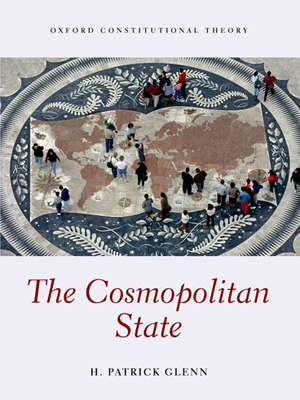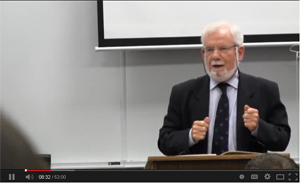 Professor H. Patrick Glenn, whose Legal Traditions of the World book received the Grand Prize of the International Academy of Comparative Law in 2010, published a hefty, provocative new book in July, entitled The Cosmopolitan State.
Professor H. Patrick Glenn, whose Legal Traditions of the World book received the Grand Prize of the International Academy of Comparative Law in 2010, published a hefty, provocative new book in July, entitled The Cosmopolitan State.
In this newest publication, The Cosmopolitan State (Oxford University Press, 2013), Glenn examines how the cosmopolitan character of states is reflected in their laws, arguing that the cosmopolitan state is the only appropriate conceptualization of the state in a time of globalization.
Once asked where he was from, Diogenes famously declared, “I am a citizen of the world” (cosmopolites) and as such he is credited for having coined the word “cosmopolitan.”
Using an interdisciplinary approach that combines constitutional law, history, political theory, international relations and new logics, Professor H. Patrick Glenn takes on this notion in his new book, The Cosmopolitan State.
Glenn argues that the Romantic idea of the nation-state, which has been widespread for over two centuries in public discourse and in academia, is in fact a failed concept. The nation-state implies that the population of a state should be homogenous in terms of language, religion, and ethnicity; that the nation and the state should coincide. “Nation-state has a nice ring to it, it makes for a nice sound bite,” he says, but since human diversity happens in states of all sizes, locations and origins, “the truth is, there never has been, and there never will be, a nation-state.”
Since the nation-state is impossible, he quips, “all states are cosmopolitan in character, in spite of themselves.” That is, regardless of the language of their constitutions or official teaching, and regardless of the extent to which they officially recognize their own diversity.
The most successful states are those which are most “successful in dealing with the inevitable internal and external diversity in which states actually function,” he says, adding that “there is no cosmopolitan universal law, but there are cosmopolitan attitudes, methods, and officials who know how to reconcile exception claims with claims for application of the law and normativity of the majority.”
Professor Glenn seeks to apply the true sense of the word ‘cosmopolitan’ to his work, where it means ‘common to, or compatible with, different countries,’ explaining that it is possible to be cosmopolitan without being universal. He goes even further, saying that the strict definition of state itself is declining, as more states are now using procedures like arbitration to privately settle disputes.

Since the notion of a nation-state has been the justification for some of the worst atrocities in human history, Glenn feels this is a salutary development, as states become more cosmopolitan.
For example, states are increasingly refraining from imposing a single citizenship on their people, and are more and more able to tolerate multiple national loyalties and gradations of citizenship. The highest courts of the lands are either referring to foreign sources in their decisions or examining foreign decisions before starting cases. But beyond that, Glenn argues that we need to apply new logics, which allow for contradictions to exist, and for middle ground.
H. Patrick Glenn is the Peter M. Laing Professor at McGill’s Faculty of Law, and president of the American Society of Comparative Law.
The Cosmopolitan State (Oxford University Press, 2013. 400 pages. ISBN: 9780199682423)
~ Lysanne Larose
[ JUMP TO THE CURRENT EDITION OF FOCUS ONLINE ]
